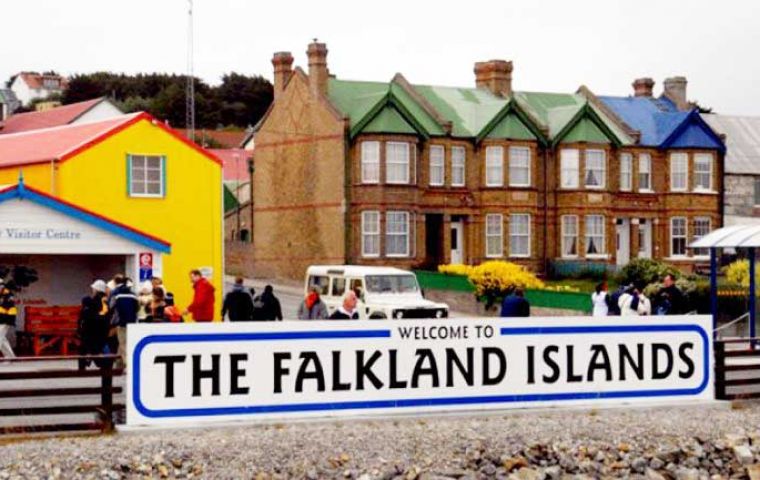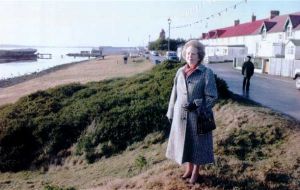MercoPress. South Atlantic News Agency
Falklands have a per capita GDP “ten times higher than Argentina”
 According to the Yearbook in the last five years the Islands' GDP has expanded 11% per year until 2012 and an even higher percentage can be expected for 2013
According to the Yearbook in the last five years the Islands' GDP has expanded 11% per year until 2012 and an even higher percentage can be expected for 2013  In 1985 Ms Thatcher changed the future of the Islanders by giving them the right to exploit the fisheries in waters surrounding the Islands (Pic REX)
In 1985 Ms Thatcher changed the future of the Islanders by giving them the right to exploit the fisheries in waters surrounding the Islands (Pic REX) Argentina's financial daily, El Cronista Comercial has published two articles on the Falkland Islands based on data from the 2014 Statistical Yearbook stating that the Islands enjoy a GDP per capita several times higher than Argentina and that the economy has been expanding at 11% annually since 2008.
The interpretation and conclusions extracted from the Yearbook sound rather sloppy, because of the insistence in getting the message of Argentina's claim over the Islands and its resources.
Thirty two years after the war the 3.200 residents in the Falklands are, with the exception of defense, virtually autonomous, and from Argentina's strategic point of view and interests, as the Islands economy grows exponentially, they are forever more distant from Argentine pretensions that they somehow are bonded to Buenos Aires plans.
The article explains that economic rewards from fisheries and growing activities derived from the exploration for hydrocarbons in the Islands waters have increased the potential for the economic independence of the area disputed by Argentina and the UK.
According to the Falklands Yearbook in the last five years the Islands' GDP has expanded 11% per year until 2012 and an even higher percentage can be expected for 2013. And accordingly this is the result of strong capital investment influxes which have concentrated in the oil industry in Falklands waters, which has attracted a great number of international companies creating jobs and wealth in the zone.
To this must be added the fisheries which seems to have advanced into a growing streak with increased number of catches, mainly squid which the Islanders turn into profits with 230 licenses.
The Yearbook then compares this with countries strong in oil and gas, such as Norway and Qatar with GDPs per capita in the range of 100.000 and 94.000 dollars, respectively; other countries such as Monaco (105.000 dollars) and Luxembourg (111.000 dollars) according to World Bank stats. And if oil and fisheries resources are subtracted GDP drops to 48.000 dollars similar to those of Japan or Austria.
History indicates that following the 1982 conflict with Argentina, London changed radically its position regarding the Falklands: Margaret Thatcher dedicated a first sum of 30 million dollars to reconstruct the Islands and later provided another 60 million dollars for infrastructure. But in 1985 she changed the future of the Islanders by giving them the right to exploit the fisheries in waters surrounding the Islands, even when these waters were claimed by Argentina.
For obvious reasons this decision was supported by a non minor appendix: all defense costs including the construction of a significant airport next to the military base in the heart of the Islands would be billed and continues to be billed to the UK. Furthermore Ms Thatcher adopted a protection attitude towards the Islanders and granted them full British citizenship, a longstanding claim from the Islanders who felt they were always considered second rate citizens of the Crown.
Today fisheries represents 34% (108 million dollars) of the Islands GDP compared to 25% for manufacturing, mining but above all the activities linked to hydrocarbons exploration and exploitation, Finally 18% to tourism and hotels.
But the real leap forward was when the Falklands were allowed to declare a 200 miles Exclusive Economic Zone round the Islands which launched the fishing industry and GDP soared from 8 million dollars in 1985 to 60 million in a few years.
In 2012, and according to the latest data from the Yearbook, the Falklands GDP now stands at 317 million dollars, well above the original estimates which means that in the last 29 years the economy expanded at an annual average of 3.862%.
Today fisheries is the great economic dynamo of the Falklands but oil will boost the economy even more, Both are tue quintessence of an economic transformation that under the strong revaluation of commodities' prices in the world has modified the lives of its inhabitants. Income from fisheries enabled the Falklands residents to have a strong surplus in recent years and as was advanced by El Cronista Comercial, “a year ago the Falklands decided to start building a sovereign wealth fund of 13bn dollars”.
But it is not the companies with activities in the Falklands that do most of the fisheries catching: the Islands government extends 25-year fishing licenses to companies from Taiwan, Korea, Spain and some joint ventures with Indonesia, while other countries have filled the southern seas with factory vessels with high seas daily catches of 50 tons. These vessels process and freeze catches onboard which are then transferred to other ships that take the cargoes to Europe.
But the important thing is that since these licenses are transferable, it allows whoever possess them (mostly local entrepreneurs) to make associations, joint ventures with any other outside company to exploit the waters of the Falklands. This means that the local resident who holds a license (but does not have the logistics or infrastructure) joins a foreign fishing company which has vessels, crews and all the staff needed for the catches and the trading.




Top Comments
Disclaimer & comment rules-

-

-

Read all commentsIt is getting harder and harder to peddle the lie that the Falkland Islanders would be better off being part of Argentina.
Nov 04th, 2014 - 05:41 am 0Perhaps they will eventually purchase a CT Scanner so that Paul can stop worrying.
Great news! now they can afford a dairy...without dead animals.
Nov 04th, 2014 - 06:00 am 0http://www.falklandnews.com/public/story.cfm?get=5301&source=3
Anglolatino please say hi to the Reynolds.
Hi Reynolds!
Nov 04th, 2014 - 06:23 am 0???
Commenting for this story is now closed.
If you have a Facebook account, become a fan and comment on our Facebook Page!